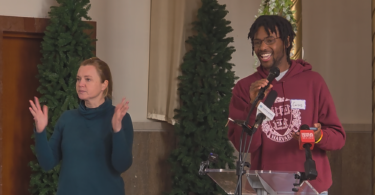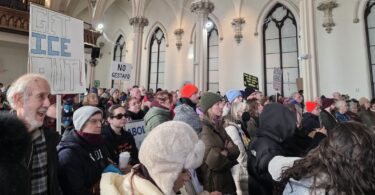Umuahia, Abia State, NIGERIA – Saturday’s long anticipated presidential and national assembly election has come and gone, but we don’t yet know who will be the country’s new leaders.
In this election, Nigerian President Muhammadu Buhari is running for re-election more than 70 challengers, with former Vice President Atiku Abubakar the closest rival. Also at stake are seats in the national Senate and House of Representatives. They are chosen to represent their local area at the national level.

Nigerians at a Umuahia pollling place on Saturday. (Nchetachi Chukwuajah/YJI)
For young Nigerians the 2019 general elections is a step towards strengthening the nation’s democracy which has survived two decades without military interruption.
One of such people is Johnson Obi, a first time voter who, though he did not get the chance to vote, believes that electioneering provides the opportunity for power to reside in the hands of the people.
“I did not vote in this election because I could not locate my polling unit on time. When I later found it, I was told the election has ended,” said Obi. “I am not discouraged; in the next four years I will be willing to vote.”
He also commended the Independent National Electoral Commission for the ability to conduct election of such magnitude.
It was the same feeling for Chibuike Chukwu, another young voter who said the election “is a way of defining our future. Whatever that happens is in our hands.”
He called on the commissioners to up their ante where there were areas of lapses.
“They should look for a way of giving the electorate orientation before the elections on how to handle the ballot papers … to reduce the number of invalid votes,” said Chukwu.
Although news reports told of violence and even fatalities in other parts of Nigeria – The New York Times reported at least 39 people dead – polling units in Umuahia, the capital of Abia State, seemed calm.
There were still problems at the Umuahia polls, however. There, the election was largely marred by the late arrival of voting materials.

Three ballot boxes at a polling place in Umuahia, Nigeria. They are for votes for president, house of representatives and senate. {Nchetachi Chukwuajah/YJI)
In some polling units, electoral materials and officers did not arrive at the venue until after noon – hours past the planned start time.
Many polling places opened late, contradicting assurances by Prof. Mahmood Yakubu, who chairs the Independent National Electoral Commission, that voting would begin nationwide at 8 a.m.
Some grumbling voters at the local government headquarters threatened to go home without casting a ballot, leading to further disenfranchisement.
At other polling units, the smart card readers that verified voter identity malfunctioned, leading electoral officers to resort to manual accreditation of voters.
And in Ward 3 of Ndume, a community in Umuahia, 22 polling places were closed on Saturday because voting materials were missing. The polls opened there on Sunday instead.
Nchetachi Chukwuajah is a Senior Reporter with Youth Journalism International.



